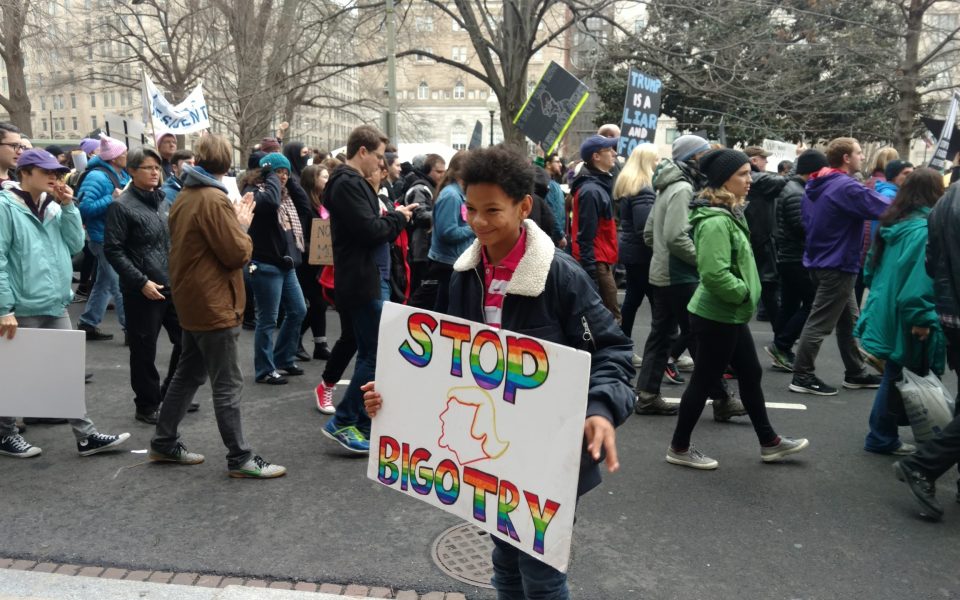Just before 6 a.m. on inauguration morning, northbound near the Po River crossing in central Virginia, I exited the shotgun seat of our large passenger van and climbed in the driver’s door of another while the travelers within slept.
More than 50 of us — activists from the Triad led by the Greensboro branch of the International Socialist Organization — had gathered in Greensboro in the first hours of Friday, Jan. 20. By 2 a.m. we had boarded a bus and three vans, each equipped with food, signs and overnight supplies, then rolled off into the night.
Some hours later, in the rearview mirror as the dawn came, I glimpsed a boy sleeping restfully as I sped us through the darkness to the capitol.
Robby Williams, a lanky 11-year-old person of color, had covered himself with a sleeping bag, only his head visible above its top. His 9-year-old cousin and his aunt slept beside him.
Nearing the city, I watched alone as a gorgeous sun rose over Washington, DC, its beauty an impossible grace against the caustic events of the day.
Finally the boy woke, quickly amazed by the monuments, flummoxed by the military hummers, the traffic and the curses from the adults inside the van.
Later, as we waited with a fool’s hope to enter the checkpoint, the inauguration ceremony unfolding on a television through a restaurant window, Robby and his cousin were conversing eagerly, holding a large banner with other members of our group.
I asked Robby’s aunt, Leah Hendershot, how she thought Robby felt about being in DC.
“He’s excited because there are so many people,” she said. “But there’s anxiety and fear, too.”
Hendershot had taken the boys to Charlotte during the protests that followed the murder of Keith Lamont Scott. She said Robby remembers the tear gas and riot techniques that police used against the protesters. This morning he had asked his aunt about the chance of a similar incident occurring in DC.
She said she brings them because they need to understand.
“We’re only as strong as we are heard,” she explained. “And we’re a part of history.”
Soon after this conversation, we heard a passerby say to this 11-year-old kid holding his rainbow “Stop Bigotry” sign: “Faggot.”
Faggot.
To the 11-year-old kid.
For much of the day the boys enjoyed themselves the way they would enjoy any day away from home. As the march ended and the rally in McPherson Square began, Robby and his cousin tossed around a pink rubber ball, and soon we were all battling for catches and showing off.
Often the ball would bounce into strangers — armed members of the National Guard or black-clothed anarchists wearing dark bandanas and brandishing dark flags — and the boys ran right to them, beaming and apologetic.
In these moments the circumstances around us seemed weightless, even funny — the ease with which we might welcome a young person’s understanding of the world.
Keith Lamont Scott.
“Faggot.”
After the last toss I was mostly separated from Robby for the rest of the day, though I remember a fist-bump goodbye before I left to take the bus home and he remained in DC for the Women’s March the following morning. I’m not sure if I’ll see him again, but I am sure I will never be able to relate to the experiences he endures for the rest of our terribly separate lives.
As we stood together in DC to resist the most recent repulsive head of state to rise from a system heretofore against him, I wished this were a harbinger of the promising future for this young boy of color in The US. But it’s far from his truth.
There is too much of history, too much of the present already striving to hold him down.
The bus ride home was quiet, none of us having slept much on the road the night before. I looked out into the starless darkness, sprinkled with the red of passing cars and the distant fires of industry.
When this night ended I knew Robby wouldn’t warily witness a slow and stunning dawn, as I had done the morning before; instead he would wake blinking into an already bright, alarming morning, one like every other, its demands and demons established eternities ago.
His aunt was glad he was there, and so was he. And so was I. Tens of thousands claim to have stood with him — millions, even, across the country.
He’s here — we all are — because we need to understand.
Joel Sronce is TCB‘s editorial intern.
Join the First Amendment Society, a membership that goes directly to funding TCB‘s newsroom.
We believe that reporting can save the world.
The TCB First Amendment Society recognizes the vital role of a free, unfettered press with a bundling of local experiences designed to build community, and unique engagements with our newsroom that will help you understand, and shape, local journalism’s critical role in uplifting the people in our cities.
All revenue goes directly into the newsroom as reporters’ salaries and freelance commissions.





Leave a Reply